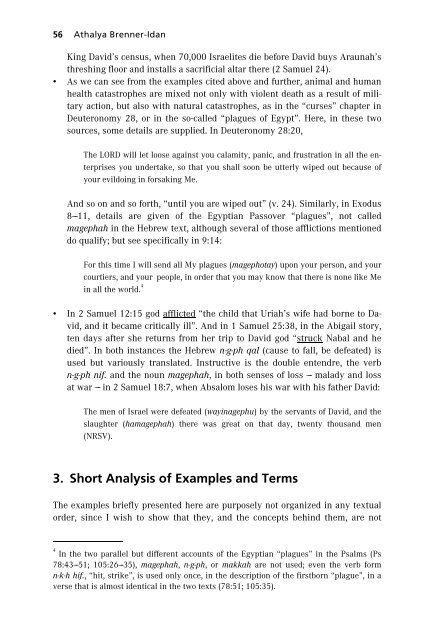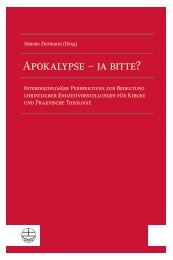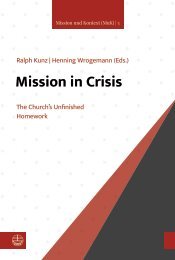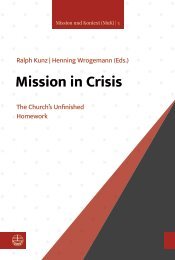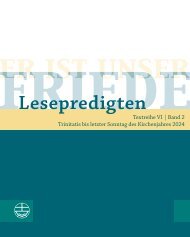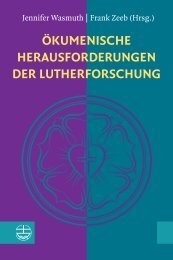Phillip A. Davis, Jr. | Daniel Lanzinger | Matthew Ryan Robinson (Eds.): What Does Theology Do, Actually? (Leseprobe)
You also want an ePaper? Increase the reach of your titles
YUMPU automatically turns print PDFs into web optimized ePapers that Google loves.
56<br />
Athalya Brenner-Idan<br />
King David’s census, when 70,000 Israelites die before David buys Araunah’s<br />
threshing floor and installs a sacrificial altar there (2 Samuel 24).<br />
• As we can see from the examples cited above and further, animal and human<br />
health catastrophes are mixed not only with violent death as a result of military<br />
action, but also with natural catastrophes, as in the ‘‘curses’’ chapter in<br />
Deuteronomy 28, or in the so-called ‘‘plagues of Egypt’’. Here, in these two<br />
sources, some details are supplied. In Deuteronomy 28:20,<br />
The LORD will let loose against you calamity, panic, and frustration in all the enterprises<br />
you undertake, so that you shall soon be utterly wiped out because of<br />
your evildoing in forsaking Me.<br />
And so on and so forth, ‘‘until you are wiped out’’ (v. 24). Similarly, in Exodus<br />
8---11, details are given of the Egyptian Passover ‘‘plagues’’, not called<br />
magephah in the Hebrew text, although several of those afflictions mentioned<br />
do qualify; but see specifically in 9:14:<br />
For this time I will send all My plagues (magephotay) upon your person, and your<br />
courtiers, and your people, in order that you may know that there is none like Me<br />
in all the world. 4<br />
• In 2 Samuel 12:15 god afflicted ‘‘the child that Uriah’s wife had borne to David,<br />
and it became critically ill’’. And in 1 Samuel 25:38, in the Abigail story,<br />
ten days after she returns from her trip to David god ‘‘struck Nabal and he<br />
died’’. In both instances the Hebrew n-g-ph qal (cause to fall, be defeated) is<br />
used but variously translated. Instructive is the double entendre, the verb<br />
n-g-ph nif. and the noun magephah, in both senses of loss --- malady and loss<br />
at war --- in 2 Samuel 18:7, when Absalom loses his war with his father David:<br />
The men of Israel were defeated (wayinagephu) by the servants of David, and the<br />
slaughter (hamagephah) there was great on that day, twenty thousand men<br />
(NRSV).<br />
3. Short Analysis of Examples and Terms<br />
The examples briefly presented here are purposely not organized in any textual<br />
order, since I wish to show that they, and the concepts behind them, are not<br />
4<br />
In the two parallel but different accounts of the Egyptian ‘‘plagues’’ in the Psalms (Ps<br />
78:43---51; 105:26---35), magephah, n-g-ph, or makkah are not used; even the verb form<br />
n-k-h hif., ‘‘hit, strike’’, is used only once, in the description of the firstborn ‘‘plague’’, in a<br />
verse that is almost identical in the two texts (78:51; 105:35).


